Mitsubishi Power: Hydrogen and Ammonia are Game-Changers in PH Renewable Transition
- December 11, 2023
- 0

The country can progressively move towards renewables and eco-friendly fuels like hydrogen and ammonia to accomplish its decarbonization objectives, an official from Mitsubishi Power Asia Pacific revealed.
In an exclusive interview with Power Philippines, Mitsubishi Power Asia Pacific CEO Akihiro Ondo said that both hydrogen and ammonia have transformative potential in renewable energy expansion.
“Our JAC (J-series Air-Cooled) gas turbines hold the world’s highest natural gas-firing efficiency, exceeding 64%, and industry-leading reliability at 99.6%. These turbines can also co-fire up to 30% hydrogen, with plans for 100% combustion verification by 2025, offering flexibility for future hydrogen-based power generation,” Ondo explained.
Shifting from LNG to a 30% hydrogen mix can cut a gas turbine’s carbon emissions by about 10%, aiding the gradual transition towards more sustainable energy sources.
Ammonia also emerged as a key player in the Philippines’ power decarbonization. Mitsubishi Power’s combustion technologies facilitate ammonia co-firing, enabling carbon emissions reduction in existing coal-fired units. Additionally, ammonia, a carbon-free fuel, acts as a carrier for hydrogen and can be wholly combusted in the smaller gas turbines. Mitsubishi Power’s ongoing technological advancements support the evolution of both hydrogen and ammonia ecosystems.
Economic and Environmental Prospects of Hydrogen and Ammonia
Ondo highlighted hydrogen and ammonia’s economic and environmental benefits as crucial fuels in the Philippines’ pursuit of reducing greenhouse gas emissions. These fuels, beyond reducing carbon emissions, can serve as catalysts for renewable energy expansion. The integration of hydrogen into the energy matrix, supported by proper infrastructure, could unlock substantial potential for utilizing renewable energy surplus and driving down costs.
Envisioning the Philippines as an offshore wind powerhouse, Mitsubishi Power anticipates up to 21GW of offshore wind capacity by 2040, an arena ripe for hydrogen and ammonia production. However, Ondo stressed the need for robust policies governing production, distribution, and utilization to harness their full potential.
Pioneering Technological Innovations
Mitsubishi Power’s innovative strides encompass cutting-edge technologies, including hydrogen-ready gas turbines and efficient steam turbines. Their commitment extends to the establishment of the Takasago Hydrogen Park, a pioneering facility validating the entire hydrogen value chain. This initiative is anticipated to revolutionize hydrogen production, storage, and power generation technologies, potentially influencing the Philippines’ energy landscape.
Collaboration for a Seamless Transition
Emphasizing collaborative endeavors, Mitsubishi Power is actively engaged in discussions and collaborations with the Philippine government and stakeholders. The company’s commitment to cleaner energy solutions aligns with the Philippine government’s Green Energy Auction Policy, presenting an opportunity to revitalize geothermal power capacity growth.
Furthermore, Mitsubishi Power’s TOMONI Hub network, integrating AI for plant operation and maintenance decision-making, plays a pivotal role in ensuring the reliability and sustainability of power generation in the Philippines. By harnessing AI and digital solutions, the company has enhanced operational efficiency and reliability across various power generation units in the country.
Recognizing the urgency of climate change, the Philippines has set remarkable renewable energy goals, aiming for 35% by 2030 and 50% by 2040 of its power generation capacity from renewables. Mitsubishi Power’s commitment to this transition has been evident, particularly in the geothermal sector, where it has supplied reliable technologies to major geothermal power plants, accounting for a substantial portion of the nation’s installed capacity.